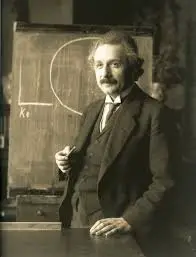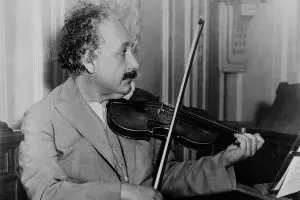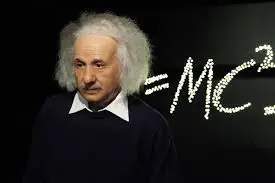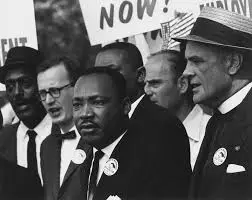Let’s find out some facts about him and don’t forget to take our Einstein quiz at the end!

His sayings and quotes are just as famous as his discoveries – Einstein was more than just a scientist. He was a philosopher and a thinker as well.

Early Life
Einstein was born in Germany on March 14, 1879. He was born in a place called Ulm, Württemberg to his father, Hermann, and his mother, Pauline. Einstein had a younger sister named Maja.
As an elementary school student, Einstein attended the Luitpold Gymnasium in Munich. He became interested in classical music and developed a passion for playing the violin.
In addition to classical music, Einstein loved math and science. By the age of 12, he had taught himself geometry. While still a teenager, he wrote his first major paper, “The Investigation of the State of Aether in Magnetic Fields.”

In 1894, Einstein dropped out of school and moved to Switzerland. There, he was admitted to the Swiss Federal Polytechnic School in Zurich due to his high scores in physics and math on the entrance exam.
Einstein eventually gave up his German citizenship and became a Swiss citizen in 1901.

Career
After graduating, Einstein planned to teach math and physics. However, he had a bad reputation for not attending his classes because he preferred to study independently.
As a result, his professors would not recommend him for teaching positions.
In 1902, Einstein became a clerk in a patent office. While working at the patent office, Einstein made some of the greatest discoveries of his scientific career.
He eventually did find an academic position at the University of Zurich in 1909. In 1913, he began working at the University of Berlin. Einstein later took a position at the Institute of Advanced Study in Princeton, New Jersey.
Theories and Scientific Contributions
1905 is often called a “miracle year” for the scientist, who was then working at the patent office. In that year alone, Einstein had four papers published in the well-known physics journal Annalen der Physik.
These papers covered various topics, including Brownian motion and the photoelectric effect. One paper focused on Einstein’s special theory of relativity, while another outlined his famous equation E=MC2.

In 1915, Einstein published the paper considered his masterwork. In this paper, he outlined his general theory of relativity. This theory declared that gravity, as well as motion, influences time and space.
The theory was a worldwide sensation. Einstein toured the world speaking about his theories and scientific work.
In 1921, Einstein won the Nobel Prize for his work on the photoelectric effect. At that point, some of his work on relativity was still controversial. Not everyone agreed with Einstein’s revolutionary theories.
Einstein in America
After World War I, the Nazis began to rise to prominence in Europe. Einstein, who was Jewish, faced hostility and threats. Jewish citizens were also prevented from working in universities or having other official jobs.
In 1932, Einstein emigrated to America, where he began working at the Institute for Advanced Study in Princeton. Einstein lived and worked in America for the rest of his life, eventually becoming a citizen.
Politics
Einstein was considered a pacifist and a socialist. He was distrusted by FBI director J. Edgar Hoover because of these views.
Some of Einstein’s theories, including his equation E=MC2, helped develop the atomic bomb. After he learned about the bombing of Hiroshima, Einstein became involved in limiting the usage of nuclear weapons.
In the 1940s, Einstein also became a member of the NAACP. He called racism a “disease” and campaigned for civil rights.

Personal Life
Einstein’s first marriage was to Mileva Maric, a fellow student at Zurich Polytechnic. The couple had a daughter named Lieserl in 1902, a year before they married, but her life remains a mystery.
After getting married in 1903, Einstein and Maric had two sons, Hans Albert and Eduard. The marriage ended in divorce in 1919.
That same year, Einstein married his cousin Elsa Lowenthal. They remained married until Lowenthal’s death in 1936.
Famous Quotes
“Everybody is a genius. But if you judge a fish by its ability to climb a tree, it will live its whole life believing that it is stupid.”
“Try not to become a man of success, but rather try to become a man of value.”
“A man should look for what is, and not for what he thinks should be.”
“A person who never made a mistake never tried anything new.”
“In the middle of difficulty lies opportunity.”

Later Life & Death
In the later years of his life, Einstein was focused on a unified field theory.
This theory would incorporate all the laws of physics. He became isolated from other scientists, who were more interested in other work.
In 1950, Einstein published an article on his unified field theory, but it remained unfinished at the time of his death.
Einstein died in Princeton, New Jersey on April 18, 1855. He was 76 years old. After his death, a team of Canadian scientists studied Einstein’s brain.
They found that that his parietal lobe, which processes mathematical thought, was 15 percent wider than in people with normal intelligence.
Researchers believe this discovery may explain Einstein’s intelligence. Whatever the reason for Einstein’s genius, he continues to be known as one of the greatest scientists in history.

Fun Facts About Albert Einstein
- Albert Einstein experienced lots of speech problems as a child. This made his parents worry that he wasn’t very smart.
- Einstein did not always do well in school. This was mostly because he didn’t like the way the school taught.
- He failed his first try on his entrance exam for college!
- In 1940, he auctioned off a handwritten version of his Theory of Relativity. It sold for 6 million dollars. He used the money to aid the war effort in WWII.
- Albert Einstein couldn’t swim.
- He never liked to wear socks. He thought they were a bother since they always got holes in them.
More Famous Scientists.
Quiz Time!

[quiz-cat id=”150″]











